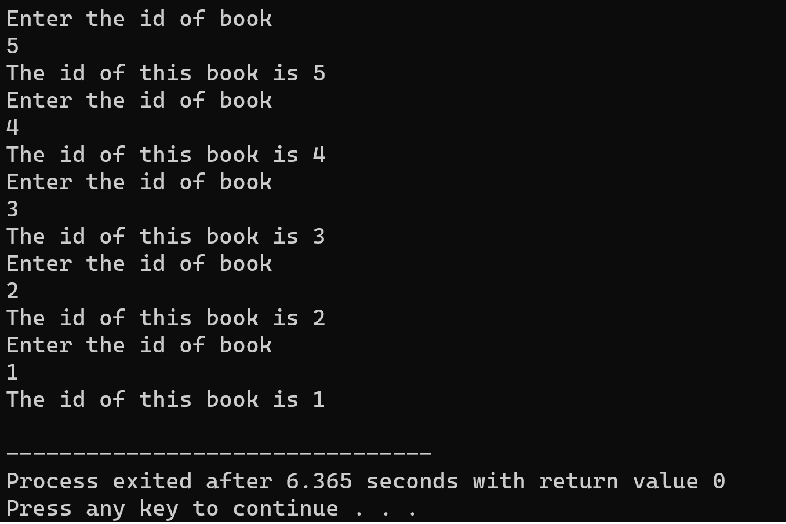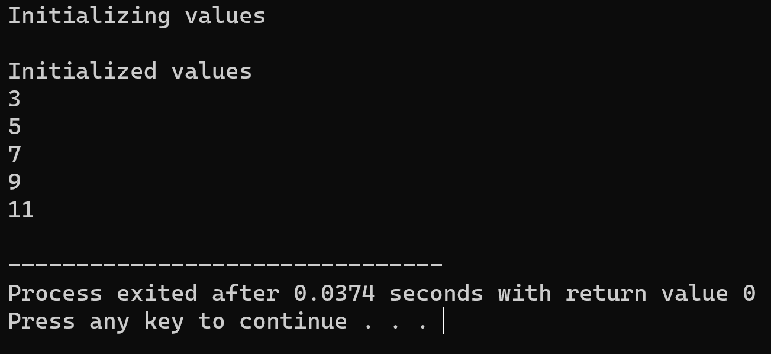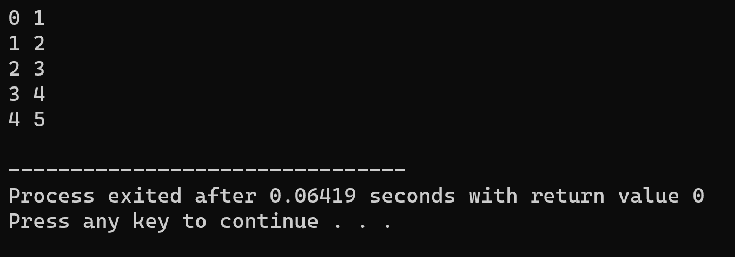Array of Object in C++
What is an Array?
In C++, an array is a group of related data types, such as int, char, float, double, etc., that are easily accessed by index value alone and saved using the index value.
Additionally, it maintains each instance of a variable in its separate variable.
In C++, there are three ways to define an array:
- By specifying the size of the array
- By initializing the array elements directly
- By specifying the size of the array along with its components.
What is an Object?
The basic components of object-oriented programming in C++ are class and object. A class is essentially a set of data structures. A data structure that is an instance of a class is an object. Therefore, no memory is allocated when a class is established; however, when an instance is created by declaring an object, memory is allocated in order to hold data and execute necessary functions on them.
Books, bikes, and sports can all be seen as different classes, with examples like programming books, honda bikes, and cricket sports.
What is an Array of Object?
In C++, an object's array and a structure's array are equivalent.
Each element of an array becomes an object (of the same class) in the C++ array of objects, making the array of objects in C++ a collection of objects belonging to the same class. In the same way that an object is made up of both data members and function members. As a result, each element of an array is made up of both data members and function members.
The object array is crucial because it saves you from having to declare ten objects for every student if you want to hold ten records for students. You can create an array of elements as the class object.
We can create each object in an array into a variable of the array type. Additionally, since every element of the array is now an object, it is possible to retrieve these objects using index values just like a regular array. The object, in this case, will have the same name as the one in the previous example, but because of the changed index value, the object will also be different.
Examples: Lets understand concept of Array of Objects in C++ using some Programs.
1. Program:
#include<iostream>
using namespace std;
class Book
{
int id;
int price;
public:
void setId(void)
{
price = 153;
cout << "Enter the id of book" << endl;
cin >> id;
}
void getId(void)
{
cout << "The id of this book is " << id << endl;
}
};
int main()
{
Book arr[4];
for (int i = 0; i < 5; i++)
{
arr[i].setId();
arr[i].getId();
}
return 0;
}
Explanation:
- In the above code, we made an employee class with two integers "id" variables and one integer "price" variable as private class members, and two voids "setId" and "getId" functions as public class members.
- A "setId" function has been defined. The "price" variable in this function is given the value "153," and the function will accept user input for the "id" variable at runtime. A "getId" function has been created. The values of the variable "id" will be printed by this function.
- Then, we used cout; cout is the object of an ostream class. The Iostream header file contains its definition. It serves as a means of displaying the output on the monitor, which is the usual output device.
- Inserting a new line character, we used here endl Command.
- Then we used a for loop.
- In the for loop, we have a condition that the "i" variable must be less than 5; if this condition is satisfied, we will enter it in the body of the loop.
- We made a data-type “Book” array called "arr" with a size of "5". "setId" and "getId" operations are carried out in a "for" loop till the array size. The most important thing to keep in mind is that although the objects can be made separately, doing so makes things more convenient if there are going to be a lot of items created.
- As we input the Id for a book, it gives us the output of the book Id.
Program Output:

Various techniques for initializing an array of objects with parameterized constructors:
Using malloc() method:
The malloc() technique will help us to avoid calling a non-parameterized function Object() { [native code] }.
To dynamically allocate a single huge block of memory with the desired size in C++, use the "malloc" or "memory allocation" technique. It gives back a void pointer that can be converted into any other kind of pointer.
It gives the variable on the heap the memory it needs and then returns a void pointer pointing to the memory block's starting location.
The values allocated in the RAM block need to be clarified and initialized. The behavior in this situation depends on the specific library implementation.
If the size supplied in the function is zero, the pointer that is returned must not be dereferenced as it may be a null pointer.
Syntax:
Void* malloc(size_t size);
- Parameters:
The size of the memory block that needs to be allocated is the only parameter that has to be given when using the malloc function. Size t is the appropriate data type for this parameter. Allotted memory must be initialized once more after being set to random values.
- Return Type:
A return type is void*. This means that the procedure returns a pointer to the address of the first memory block allotted on the heap. This pointer is created on the stack. The pointer that is returned is null and shouldn't be referenced if the size supplied in the arguments is 0.
How does C++'s malloc() method operate?
The header file for the C++ library's <cstdlib> contains the malloc function. Utilizing the heap, where variables have a longer lifespan, this approach is used to allocate a memory block to a variable or array.
When this method is called for a size t variable with a specific size, the compiler looks up the same amount of memory on the heap and returns a reference to the memory block's beginning address. The returned pointer is a void pointer, which means that it can be quickly changed into a pointer of any datatype. A NULL pointer is returned when the size of a memory block is set as 0, operating in an indeterminate manner, and it must not be dereferenced.
This constructor is not called by the function. It prevents numerous segmentation fault errors since memory is allocated dynamically. No other program can utilize the memory block allotted via this function until the memory block is released from that specific pointer, meaning that it cannot be overridden. So, in order to experience good memory management by our system and improved performance, one must free the memory that is being allocated using the malloc method.
Additionally, it is important to keep in mind that the size of the block must be manually determined according to the requirements. For example, if the array contains values of the int type, the memory being allocated must be larger than the memory size of an int variable.
Program:
#include <iostream>
#include <cstdlib>
using namespace std;
int main() {
// allocate 5 int memory blocks
int* arr = (int*) malloc(5 * sizeof(int));
// Verify whether memory has been successfully allocated.
if (!arr) {
cout << "Memory Allocation Failed";
exit(1);
}
cout << "Initializing values" << endl ;
cout<<endl;
for (int i = 0; i < 5; i++) {
arr[i] = i * 2 + 3;
}
cout << "Initialized values" << endl;
// print the values stored in the allocated memory
for (int i = 0; i < 5; i++) {
// arr[i] and *(arr+i) can be used simultaneously
cout << *(arr + i) << endl;
}
// deallocate memory
free(arr);
return 0;
}
Explanation:
- The #include directive instructs the preprocessor to include the contents of the iostream file in the program. It includes declarations for the identifier cout, cin, insertion operator (<<), and extraction operator (>>).
- The header file for the C++ library's <cstdlib> contains the malloc function. This header defines a number of all-purpose operations, such as searching, sorting, converting, integer arithmetic, dynamic memory management, random number generation, and environment communication.
- The scope of the identifiers used in a program is defined by the namespace. We must include the using directive in order to use the identifiers defined in the namespace scope.
- In the main() function, we've used malloc() to give the “arr” pointer 5 blocks of int memory. As a result, “arr” now works as an array.
- The void pointer returned by malloc() has been type converted to int*.
- Afterward, we use an if statement to determine whether the allocation of memory has been successfully allocated or not. If it is not successfully allocated, then the program is ended.
- Then, we use cout; cout is the object of an ostream class. The Iostream header file contains its definition. It serves as a means of displaying the output on the monitor, which is the usual output device.
- Inserting a new line character, we use here endl Command.
- After that, we employed a for loop, and with the aid of this loop, we'll initialize the memory block that was allocated with integer values.
- In this loop, we initialize the “i" variable with 0, and we have a condition that "i" must be less than 5. When this condition is satisfied, we will enter the body.
- In the body, we perform an arithmetic operation, and the result will be stored in the array "arr[i]”.
- Following that, we utilized another for loop. Using this loop, we will print the values that were initialized in the first for loop.
- In this loop, we initialize the “i" variable with 0, and we have a condition that "i" must be less than to 5. When this condition is satisfied, we will enter in the body.
- In the body, we use the cout object for displaying the initialized value, which is present in the memory block.
- After that, we used the free() function to deallocate the memory.
Program Output:

Using new Keyword
An allocation of memory on the Heap is requested using the new operator. The new operator returns the location of the newly allocated and initialized memory to the pointer variable if there is enough accessible memory to do so. The pointer in this case, is called a pointer-variable. Any user-defined data type, such as class and structure, as well as any built-in data type, such as an array, can be used as a data type.
If a parameterized constructor is added, the dynamic initialization new keyword requires a non-parameterized constructor. In order to do this, we shall create a dummy constructor.
Syntax:
Ptr_variable = new data_type
- Ptr_variable: This is an illustration of a pointer variable pointing to a datatype.
- new: The memory cells are created and allocated to the data type using the keyword new.
- data_type: Any data types, such as built-in data types like array, structure, and class, can be considered as data type.
How does new operator work in C++?
A new keyword denotes that the memory allocation has changed whenever it appears in the picture. Does it take into account the variable's current demand. Given that the new operator performs memory allocation as well as initialization, whereas the operator simply performs allocation, there is a distinction between new and operator new.
Conceptually, operator new is smaller than malloc and is a function used to allocate memory. By default, the heap allocation logic is overridden using the malloc function. Since no memory is initialized, it cannot. It doesn't call any constructors, but once an overloaded operator is invoked and returns new, the compiler will then automatically invoke the appropriate constructor as needed. The operator can be overloaded either globally or for a particular class.
Additionally, there are other distinctions that must be carefully considered, such as the fact that
- The new is both an operator and a keyword as opposed to the operator new, which is merely a function. In a manner similar to how the + operator calls for the operator+, the new operator calls the new operator ().
- Another very intriguing aspect is that the operator new, and the new keyword continues to be used. The new operator enables all programmers to develop any kind of customized jobs, which aids in overloading the functions and provides users with an improved and intriguing feature.
- In addition, new is a very exact operator in C++ that first calls an expression with the new operator and a function while taking the size of the type it provides for the first argument into consideration. The initialization process for the object's construction will be initiated automatically if this function is successful (urgently).
The expression does, at the very least, evaluate as a pointer to the correct type. Allocating storage space using the default allocations functions is the new operator's primary responsibility or goal. Additionally, the default allocation functions—throwing allocation, nothrow allocation, and placement—are mentioned. Throwing allocation is a function that is included in the new operator that deals with the size of bytes that are allocated to storage space. It then appropriately attaches itself to the object of that size to return any non-null pointer for the first byte of the block, and if the allocation fails, it throws a bad allocation exception.
These default constructors play a significant role in the new operator with the allocation and deallocation of functions with special components in the standard library that include a number of distinctive properties like global, which includes all three iterations of the operator and is used for declaring in the global namespace with Implicit and Replaceable functions acting primarily as part of the operator new. For the first and second versions, all parameters and return type values refer to the newly created storage space using pointers. Still, the placement uses ptr as the return type for the new operator invocation in terms of space allocation.
Program:
#include <iostream>
#define N 5
using namespace std;
class Test {
// private variables
int i, j;
public:
// dummy constructor
Test() {}
// parameterized constructor
Test(int i, int j)
{
this->i = i;
this->j = j;
}
// function to print
void print() { cout << i << " " << j << endl; }
};
int main()
{
// allocating the dynamic array
// of Size N using a new keyword
Test* arr = new Test[N];
// calling constructor
// for each index of an array
for (int x = 0; x < N; x++) {
arr[x] = Test(x, x + 1);
}
// printing contents of array
for (int y = 0; y < N; y++) {
arr[y].print();
}
return 0;
}
Explanation:
- In the above code, we used the #define directive. Before the program is compiled, the programmer can give a constant value a name using the helpful C++ feature #define. References to these constants will be replaced by the defined value at compile time by the compiler.
- The scope of the identifiers used in a program is defined by the namespace. We must include the using directive in order to use the identifiers defined in the namespace scope.
- Now in the class, we took two variables, i and j, with the constructor.
- Next, we created a fake constructor. The fake constructor with the name “test()” is enclosed in curly braces and contains no statement.
- Next, a parameterized constructor with the name "test()" is created. Two parameters are contained within the constructor parenthesis. The first parameter is a variable named I with an int data type, and the second parameter is a variable named "j" with an int data type.
- In the constructor curly braces, we use the "this" keyword
- Now in the main function, we declared an array of type 'Test'.
- Then we inserted the value in the array using a new keyword and printed those values using a specific function.
- We use for loop; with the help of this loop, we call the constructor and access each index of an array.
- In this loop, we initialize a variable "x" with 0, and we have a condition that "x" must be less than N. When this condition is satisfied, we will enter in the body of the loop.
- Then we use another for loop; with this loop, we will print the content of the array. In this loop, we initialized "y" with 0, and we have a condition that y must be less than N. if this condition is satisfied, we will enter in the body of the loop.
- In the body, for printing the content of the array, we use print() function with the dot(.) operator. With the dot operator, we can access each element of the array "arr[y]”.
Program Output:
